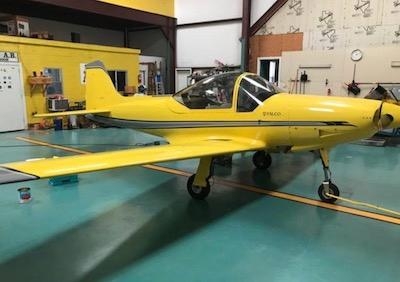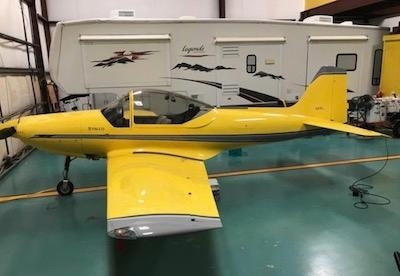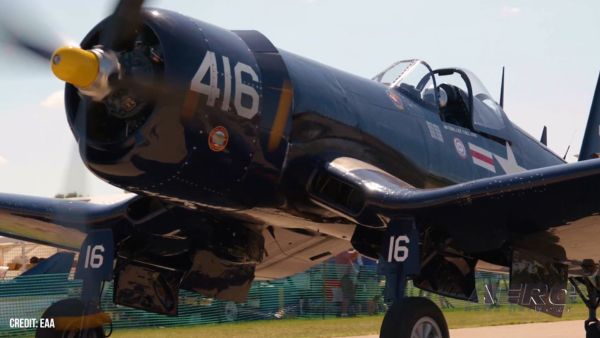Wed, Jul 18, 2018
Designed in 1955 With Looks That Are Timeless
By: Tom Woodward
In 1955 renowned aircraft designer Stelio Frati designed the Falco which was originally built in Italy by Aviamilano then Aeromere and later Laverda as a certified aircraft. In the 1980s the Falco was converted to kit form and sold in the US by the Sequoia Aircraft Company of Richmond, Virginia until 2014 when it closed its doors. Sequair, the Virginia company still maintains a website with much valuable information about this sleek and sexy looking aircraft. The FAA website lists about 61 Falcos under US registry but there are many others flying throughout the world both certified and kit built.

The Sequoia Falco is constructed of Spruce and typically Finnish birch plywood. The structure is built from laminated spruce bulkheads and the birch plywood is used for the skins. It’s powered by a Lycoming 160 to 180 HP engine and is widely considered to be one of the best handling, strongest and most aesthetically pleasing aircraft kits available today. The aircraft is rated for 6G positive and 3G negative.
Building a Falco is a labor of love and no special skills are required but a love of woodworking helps, because by the time you have a flying airplane you will have between 3000-5000 hours of labor involved. Nothing is difficult, but it is time consuming and though the fasted built Falco took only 13 months, most will take years and some decades but the patience to finish one will pay off in the most enjoyable flying experience.

Having before flown and now owning a Falco (Oshkosh winner in 2005) I can attest to the precise, smooth harmony of the controls, such that you only have to think where you want the airplane to go and it responds to your whim. On 160 hp the Falco will cruise at 160kts at 25 squared though others who have been finicky about drag reduction have seen over 200kts. With a 160hp Lycoming this can be done at about 8-9 gph making the Falco not only sexy and fast but also efficient. To me it is more comfortable than an RV 6 with a larger baggage area. The step up onto the wing is lower than an RV due to the length of the retractable gear. Gross weight is set by the builder but GW’s of up to 2250 lbs are possible. With 40 gallons of fuel you have a pretty good payload though you have to watch the CG because the wing carries no fuel as the tanks are forward and aft of the cockpit.
(Images provided by the author)
More News
“While legendary World War II aircraft such as the Corsair and P-51 Mustang still were widely flown at the start of the Korean War in 1950, a new age of jets rapidly came to >[...]
Decision Altitude (DA) A specified altitude (mean sea level (MSL)) on an instrument approach procedure (ILS, GLS, vertically guided RNAV) at which the pilot must decide whether to >[...]
Aero Linx: National Aviation Safety Foundation (NASF) The National Aviation Safety Foundation is a support group whose objective is to enhance aviation safety through educational p>[...]
Also: Cal Poly Aviation Club, $$un Country, Arkansas Aviation Academy, Teamsters Local 2118 In response to two recent general aviation accidents that made national headlines, more >[...]
“The FAA is tasked with ensuring our skies are safe, and they do a great job at it, but there is something about the system that is holding up the medical process. Obviously,>[...]
 Aero-News: Quote of the Day (04.28.25)
Aero-News: Quote of the Day (04.28.25) ANN's Daily Aero-Term (04.28.25): Decision Altitude (DA)
ANN's Daily Aero-Term (04.28.25): Decision Altitude (DA) ANN's Daily Aero-Linx (04.28.25)
ANN's Daily Aero-Linx (04.28.25) Airborne-Flight Training 04.24.25: GA Refocused, Seminole/Epic, WestJet v TFWP
Airborne-Flight Training 04.24.25: GA Refocused, Seminole/Epic, WestJet v TFWP Aero-News: Quote of the Day (04.29.25)
Aero-News: Quote of the Day (04.29.25)




